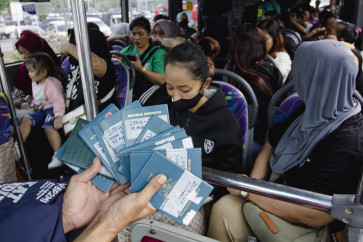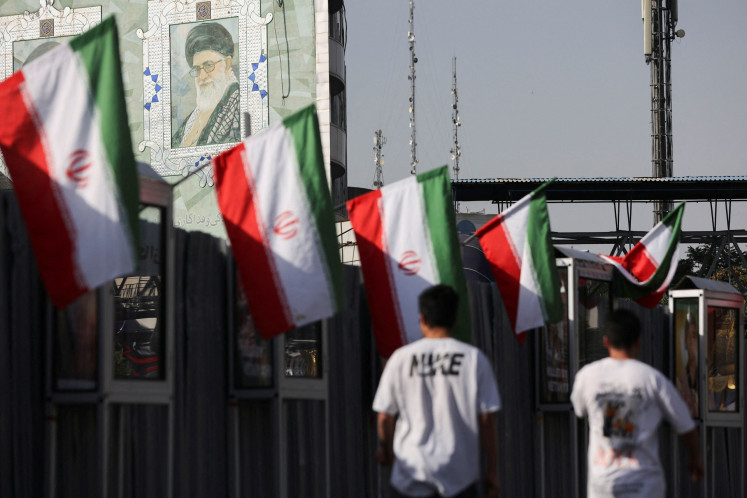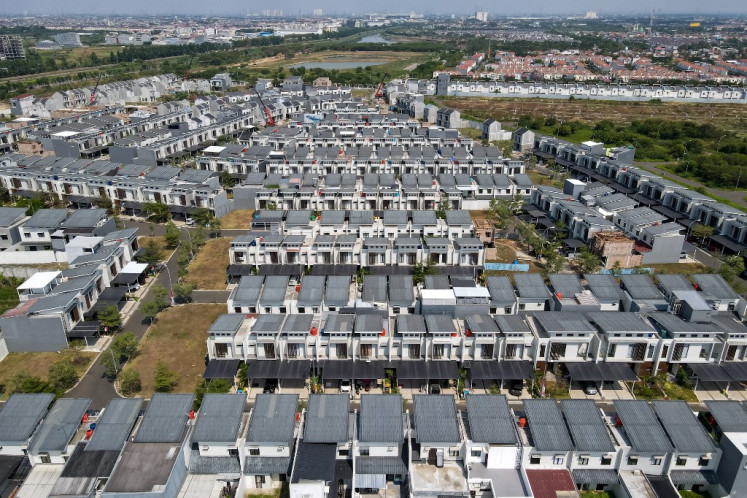Popular Reads
Top Results
Can't find what you're looking for?
View all search resultsPopular Reads
Top Results
Can't find what you're looking for?
View all search resultsAnalysis: Unavoidable rising prices of staple foods
As we approach the month of Ramadhan and head toward Idul Fitri, increases in the prices of goods, especially those of staple foods, are unavoidable
Change text size
Gift Premium Articles
to Anyone

As we approach the month of Ramadhan and head toward Idul Fitri, increases in the prices of goods, especially those of staple foods, are unavoidable. These seasonal price rises are influenced by increasing public demand and need. The increased prices of staple foods can be particularly significant if the availability of goods needed by the public is insufficient. While the trend of rising prices is partially caused by additional consumer demand, inflation in the fasting period is also affected by price increases at the level of manufacturers and distributors, as well as by the speculative actions of traders who hoard food materials or engage in unilateral games of price manipulation.
In the last five years, during the fasting month and Idul Fitri, the average increase in the consumer price index has been 0.98 percent, higher than inflation in other months, which has an average of 0.36 percent. The greatest increase in monthly inflation during the fasting month occurred in 2013, when average inflation in July-August reached 2 percent. In 2014, inflation in June-July was in the range of 0.68 percent, while the average for the other 10 months amounted to 0.67 percent. High inflation in this period was driven by a rise in commodity prices, especially those of basic food products. A similar phenomenon is expected to happen again this year. The National Statistics Agency (BPS) has already released data showing that the inflation rate increased by 0.5 percent in May 2015 from the previous month of April. The higher than expected inflation in May was mainly driven by a rise in the prices of food materials of 1.39 percent.
Historically, prices usually begin to increase two months before Ramadhan begins. Typically, prices begin to crawl upwards and then stabilize for at least one month after Idul Fitri. Price fluctuations also occur gradually starting from the manufacturing level.
Data we gathered from BPS on trends on the prices of unhusked and husked rice from their time of production revealed that during May 2015, the average price of the dried un-husked rice harvest at the farm level increased by 7.83 percent month-on-month (mom) to Rp 4,428.4 (33 US cents) per kg, as was the case at the milling level where the price of un-husked rice also went up by 7.69 percent mom to Rp 4,509.2 per kg. Meanwhile, the price of husked rice rose by 10.1 percent in May 2015 compared to the same period last year. In addition to observations made at the manufacturing level, the increase in agricultural commodity prices was also reflected in the rise of the wholesale price index (agents) in the agricultural sector in May 2015.
The wholesale price index rose by 7.35 percent from the previous month to a level of 222.6. Nationally, food commodities other than rice ' such as red chilies, eggs and meat ' have experienced significant price increases recently. Rising prices in the supply chain originating on the manufacturers' side will ultimately translate into high food prices, which will make its way into traditional and semi-modern markets and will affect consumers.

In addition to food prices, for the duration of the fasting month and Idul Fitri, the demand for transportation, clothing and various supporting facilities also typically rise. Increased public purchasing power during the fasting month and Idul Fitri holiday derives, at least in part, from the holiday allowances (THR) given to workers in various companies.
If there were no control or supervision on the part of the government and other relevant authorities, then monopoly prices with unilateral increases would unquestionably lead to higher inflation in this busy season. Conversely, if prices are controlled through market operations with official rules laid out by the government or the authorities, the inflation rate can be controlled.
Price increases ahead of the fasting month have also been indicated by acceleration in the Retail Sales Index as illustrated in a Retail Sales Survey released by Bank Indonesia. In this survey, it was indicated that the Retail Sales Index as of April 2015 had reached 177, up 22.4 percent compared to the same period last year. In comparison to March 2015, this index had increased by 2.7 percent. Increases have mainly occurred in the information and communication equipment sector, followed by food, beverage and tobacco sectors. In addition, following the March 2015 price hike, the fuel sector has also helped to push up retail sales going into the immediate future. Price pressures in June 2015 were driven by rising public demand.
Bank Indonesia also expects that growth in retail sales will once again gain momentum in October 2015. The Price Expectation Index for the upcoming six months showed an increase and reached 135.5 (from the previous level of 131.7), due to distribution and weather problems.
In the future, all parties should pay careful attention to the various risks that affect price increases. Inflation can be triggered in particular by developments in world oil prices, the rupiah exchange rate against the US dollar, and adjustments to administered prices including fuel and electricity price policies (as regulated by the government). In addition, the volatility of food prices as relates to weather disruptions and seasonal factors ahead of the fasting month and Idul Fitri should be an important concern given that these take place every year.
Price spikes during the fasting month and Idul Fitri have become an annual tradition. Government supervision is essential in order to avoid excessive volatility in the market at this time. The government must take various policy measures and actions that are required to maintain the availability of food and stability of food prices, such as regular market operations in all regions in Indonesia, unannounced inspections of traditional and semi-modern markets, and improvements to the distribution infrastructure, especially in areas where commodities are transported, so as to allow for the import of commodities whose supply cannot be fulfilled domestically. Furthermore, inflation control policy coordination needs to be improved and strengthened both at the central level as well as in the regions by means of improved performance from the Inflation Control Team. Education and the dissemination of relevant information to the public is also required. Anticipatory measures ought to be prepared far in advance so as to minimize the inflationary pressures on society.

_______________________
The writer is a quantitative analyst at Bank Mandiri.









